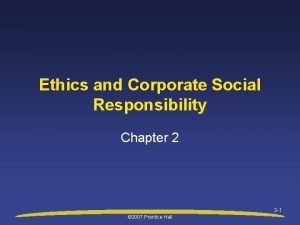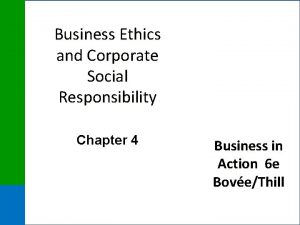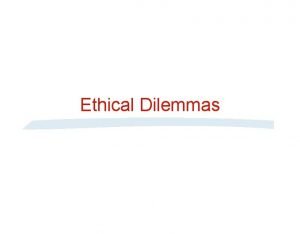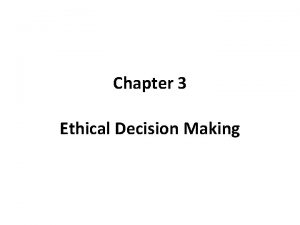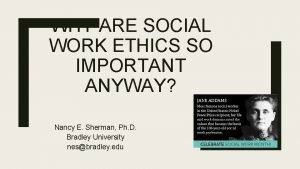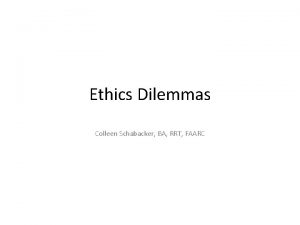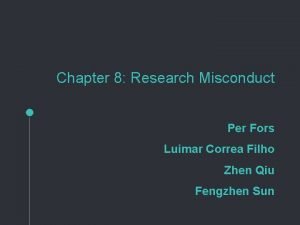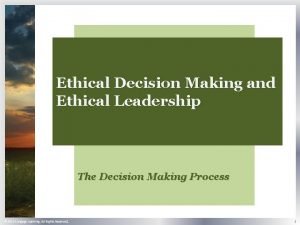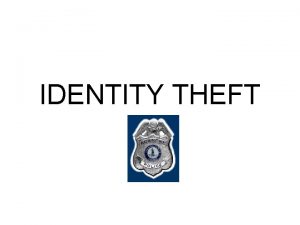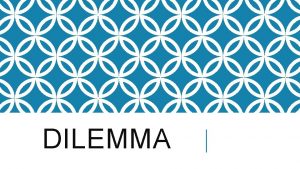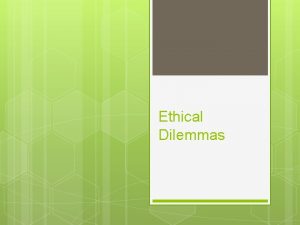Academic Dishonesty WorkIdea Theft Group 3 Ethical Dilemma













- Slides: 13

Academic Dishonesty Work/Idea Theft Group 3

Ethical Dilemma Non specific mores for crediting discoveries. It seems only ethical that the person who generated the hypothesis and proved it with experimental data be afforded credit for his or her discovery. Patent and copyright laws have established this expectation. False attribution is increased in frequency. Investigators who lack initial insight, but are technically skilled, can reproduce other researchers’ findings and submit their original research for publication Scientific conferences, the fear of potential theft of ideas. Researchers hesitate to confide new findings to their colleagues. The safest strategy is to reveal the results only after they were accepted for publication.

Should one share unpublished material? Sharing unpublished results can have negative consequences (such as other people stealing your results or ideas). You have to have something to present at conferences before you have any publications. You may want feedback from colleagues before publication. In this respect the following questions may arise: When and where to show your results? How much I can present? How detailed?

Ethical Problems/Conflicts Unpublished data or ideas can be stolen e. g. at the conferences. Somebody might be working on the same thing; can they use your results or ideas? Conflict between you and collaborators or funding agencies, if one of the party doesn’t wish to disclose the results too early Research should be open to the public and discussed. It should be conducted in interest of benefiting the society; research results should be disclosed without affecting the interests of the researchers and the sponsoring firms You may miss important input to your work or even collaboration if (some) results are not presented "If you have an apple and I have an apple and we exchange apples then you and I will still each have one apple. But if you have an idea and I have an idea and we exchange these ideas, then each of us will have two ideas. “ (George Bernard Shaw)

Example: Abstract for the Conference Rothman N, et. al. Genetic variation in TNF and IL 10 and risk of non-Hodgkin lymphoma: a report from the Inter. Lymph Consortium. Lancet Oncol 2006 Jan; 7(1): 27 -38

Alternatives to the solution Ø Present results in general and hide important points if possible (obscuring details). Ø Sharing with a select group of people. Ø Not participating in conferences before publication is submitted. Ø In case of presentation and some results needs to be disclosed , ask to not record anything and delete presentation if a common computer was used.

Example: Dual Carbon Battery developed by Power Japan plus Important details about the performance of the battery are made public; however, the electrolyte, which is essential component of the battery, is not revealed on account of the commercial value of the ‘discovery. ’

Groups/individuals/organisations being affected • • • You Collaborators The larger community Industry Groups working in the same research field

Values, interests, and attitudes that are involved in the use of the solution. Possible alternatives Values: Communalism (CUDOS) Interests: Promotion of you. Protection of your and collaborators claim to certain ideas Attitudes: Lack of feedback if not presented -> can result in missed opportunities to improve the work.

History Lack of recognition of crucial contributors 1953 James Watson, Francis Crick and Maurice Wilkins: Landmark discovery of the DNA structure. Nobel Prize Rosalind Franklin (acknowledgement at the end of the paper) was not recognized. Watson and Crick had, without her permission, gained access to Franklin’s high-quality X-ray crystallographic films of DNA, which allowed them to correct their model and deduce the true structure of DNA.

Stakeholders interests duties… Stakeholders You Collaborators Employer (University, Industry…) Larger Scientific community Others Interests Value Attitudes Standpoints Communalism (CUDOS) Other groups in same field Promotion vs. Guarding results

Effects of solutions Sharing everything Promotion of you, collaborator and employer Feedback before publication Communalism Sooner spread of results (community, groups, others) Sharing but Obscuring Dilemma: Sharing results Sharing to select group “Safe” from theft Sharing nothing until Competing groups do not know you are competing publication Can patent

Best solution from an ethical perspective Continuous discussion with all involved in the project ü Can it be presented? ü What should be presented? ü What could happen if it is presented? Worst case scenario? ü If some anyway disagree to present the material – try to find a solution that will work for all involved Anyone in this room that have experienced problems regarding presenting material before publication? Ø How did you handle that? Ø If not – how would you deal with that, if it happens?
 What is academic dishonesty
What is academic dishonesty Usc academic dishonesty
Usc academic dishonesty Uta academic dishonesty
Uta academic dishonesty Perbedaan ethical dilemma dan ethical lapse
Perbedaan ethical dilemma dan ethical lapse Perbedaan ethical dilemma dan ethical lapse
Perbedaan ethical dilemma dan ethical lapse Ethical dilemma in research
Ethical dilemma in research Dental hygiene code of ethics
Dental hygiene code of ethics Ethical dilemma example
Ethical dilemma example Ethical rules screen nasw code of ethics
Ethical rules screen nasw code of ethics Volkswagen quiz
Volkswagen quiz Dilemma
Dilemma Ethical dilemma
Ethical dilemma Army ethical reasoning model
Army ethical reasoning model Ethical habits
Ethical habits



